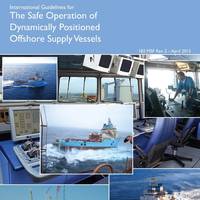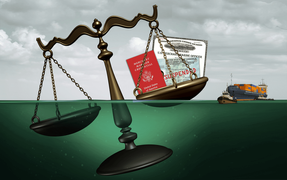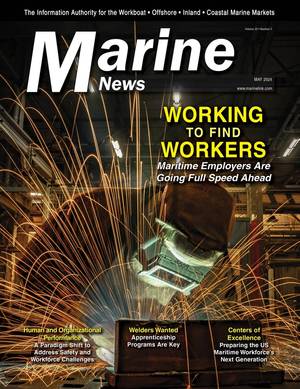IMO Accepts IMCA Paper as Basis for Updating DP Guidelines

The International Maritime Organization (IMO) has agreed to continue using the International Marine Contractors Association (IMCA) document covering the Guidelines for Training and Experience of Key DP Personnel as the basis of the IMO Guidelines for Dynamic Positioning System (DP) Operator Training (MSC/Circ.738). The IMCA Guidance on the Training and Experience of Key Dynamic Positioning Personnel (IMCA M 117) has recently been revised and earlier this week IMO Sub-Committee on Human Element, Training and Watchkeeping (HTW 4) agreed to revise MSC/Circ. 738 to reflect the revision.
Changes In The Air For IMCA's eCMID

From January 2018 the International Marine Contractors Association’s (IMCA) will recognize only formal inspection reports conducted using its eCMID database, meaning that paper reports not uploaded into the database will no longer be considered by IMCA to be authorized inspection reports. The whole eCMID system is now based on the principles described in the ISO 19011 Guidance for Auditing Management Systems standard and is aligned with other comparable industry guidance on safety management system assurance.
IMCA Launches Series of Regulatory Update Bulletins
Today’s regulatory agenda is being increasingly driven by environmental issues. Shipping is under increasing pressure to lower greenhouse gas emissions and to contribute to global efforts to counter anthropogenic climate change. The pressure is unlikely to abate; on the contrary shipping should expect these pressures to increase. The International Marine Contractors Association (IMCA), which has Observer status at the International Maritime Organization (IMO), has therefore launched a series of regular ‘Regulatory Update’ bulletins, the first of which is on the IMCA website, to keep members informed about regulatory developments. “Our Regulatory & Policy Affairs Team is committed to keeping the bulletins short and to the point,” explains IMCA’s Chief Executive, Allen Leatt.
IMCA Appoints Bradshaw as Policy and Regualtory Affaris Manager

Strengthening its policy and regulatory affairs team, the International Marine Contractors Association (IMCA) has appointed John Bradshaw as Policy and Regulatory Affairs Manager to lead on worldwide policy and legislative issues, with responsibility for developing and delivering the international trade association’s policy and regulatory strategy, including representing members with regulators and other third parties. Bradshaw joined the IMCA Secretariat as one of its strong team of Technical Advisers in early Autumn 2015.
DP Documents Revised, Published by IMCA

Two International Marine Contractors Association (IMCA) documents, often written into contracts by clients, have been fully revised and published. ‘Guidelines for the Design and Operation of Dynamically Positioned Vessels’ (IMCA M103 Rev 2), and ‘Guidance on Failure Modes & Effects Analyses (FMEA)’ (IMCA M166 Rev 1) are both now freely available on the IMCA website. “Both important documents were reviewed using the IMCA ‘open forum’ web-based system introduced last year,” explains IMCA’s Technical Director, Richard Benzie. “This made for wide stakeholder engagement.
IMCA Report Covers Mini RadaScan System for DP Ops

Reliable and robust methods of positioning are required for safe vessel operations at offshore installations. The development of dynamic positioning (DP) systems has been gradual over the past 50 years and today, various manufacturers’ systems are available around the world. IMCA has published a report, IMCA M 229 ‘Mini RadaScan microwave radar sensor for dynamic positioning operations’ to provide an overview of the Mini RadaScan system. “Every measurement technology is bound by limitations (i.e. physics) and external factors (e.g.
IMCA Publishes Renewables Contracting Principles
The International Marine Contractors Association (IMCA) has published a variety of guides, templates and discussion documents aimed at raising awareness on contracting issues, promoting discussion and providing tools that may be useful for its contractor members, their clients and sub-contractors, the latest is the series is ‘IMCA Renewables Contracting Principles’ which can be downloaded from the Safety and Legislation section of the IMCA website at www.imca-int.com. “Each of our Contracting Principles’ documents (of which there are now five in addition to a discussion document and other associated documentation) is published as an aide to clients and contractors alongside their in-house standard contracts and other industry publications…
IMCA Publishes Security, Emergency Guidance

The threat to maritime security from piracy, terrorism, criminal acts, and hostage and kidnapping threats continues to pose challenges to ships’ owners, masters and crew members, and has resulted in the International Marine Contractors Association (IMCA) (Booth S16 at OTC) publishing ‘Security Measures and Emergency Response Guidance’ (IMCA SEL 037, IMCA M 226). “Safety is of paramount importance, and our document aims to provide guidance to masters, company and ship security officers and other crew members and staff…
IMCA Publishes Guidelines for DP OSV Safe Operations

Reliable and robust methods of positioning are required for safe vessel operations in close proximity to offshore installations. Dynamic positioning (DP) is well-established as a primary method of vessel positioning in the diving, drilling, construction, accommodation and shuttle tanker sectors, and is especially suited to deep-water developments. As development and management of DP becomes more refined, increasingly logistics support vessels are becoming equipped with DP systems with increasing reliance being given to such systems.
IMCA DP Proposal to be Basis for Updating IMO Guidelines

The International Maritime Organization (IMO) has agreed to use the International Marine Contractors Association (IMCA) proposals as the basis for the review of the IMO Guidelines for vessels with dynamic positioning (DP) systems (MSC/Circ.645). The review will be taken forward by an IMO intersessional correspondence group that will further develop the draft, with a view to finalizing it at the next meeting of the IMO Ship Systems and Equipment (SSE) sub-committee, in 2016. “IMO’s circular 645 is the established international standard for DP systems.
Wire Rope Integrity Regulatory Update

Current state-of-the-art wire ropes, updated regulation references, and flow diagrams to assist with the wire rope integrity management process have been included in the revised ‘Guidance on Wire Rope Integrity Management for Vessels in the Offshore Industry’ just published by the International Marine Contractors Association (IMCA SEL 022 Rev.1/ IMCA M 194 Rev. 1). “This document offers guidance on the necessary elements of an integrity management system required to achieve an acceptable level of ongoing safety for the use of wire ropes in a marine environment…
IMCA to Host Wire Rope Workshop
The International Marine Contractors Association (IMCA) Wire Rope workgroup has held three Wire Rope Workshops, the fourth in the series ‘Optimum System Design for High Value Subsea Construction Ropes’ will be held 18 March 2014 at the Radisson Blu Hotel at Amsterdam Airport. “Our biannual Wire Rope Workshops are proving extremely relevant and interesting. Over 90 attended the last one in Amsterdam in October which focused on the lubrication of high value subsea construction ropes; others have looked at high value wire rope issues, and at non-destructive testing” explains IMCA’s Technical Director, Jane Bugler. “The March event will embrace the operators’ view of current and future system requirements…
Verifier Training Guidance Published

The International Marine Contractors Association (IMCA) Competence Assurance & Assessment guidance, originally launched in January 1999 and regularly updated (last update 2012), is designed to facilitate improved safety in the offshore industry by providing a framework for IMCA’s marine contractor members to assess and demonstrate to other the competence of their safety-critical personnel. Now new associated guidance has been published for verifier training. “Assessment naturally should be supported by verification of the assessment of the individual’s competence…
IMCA Publishes Simulator Use Guidelines
Simulators are used increasingly in the marine contracting industry, in particular for training and competence purposes, but also for work planning/mission planning purposes including engineering development, procedure development, technical assessments, research and asset risk assessment. The International Marine Contractors Association (IMCA) has published a revision to ‘Guidance on the Use of Simulators’ (IMCA C 014 Rev 3). “This document, originally published in 2010 and updated in August 2011 and then again in June 2012, and now once more in 2013 – proof of the increasing use of simulators in our industry – provides guidance on the use of simulators in training and competence,’ explains IMCA’s Technical Director, Jane Bugler.
IMCA Publishes Guidance on Occupational Health
Occupational health programs aim to anticipate and prevent health problems caused by work. All companies should have in place appropriate arrangements for the effective planning, organization, control, monitoring and review of the necessary preventive and protective measures for workers, taking into account the activities the worker will be undertaking. The International Marine Contractors Association (IMCA) has published high level guidance on this vital issue - ‘Guidance on Occupational Health’ (IMCA SEL 033) - which provides guidance on the physical and mental condition of all people at the workplace be they employees, contractors or visitors, and their protection from harm in the form of injury or disease.
IMCA Publish eCMID & CMID Guidance
The International Marine Contractors Association (IMCA) advise on printed & electronic versions of its Common Marine Inspection Document (CMID). Both versions of the CMID have proved invaluable by providing a standard format for inspection of offshore vessels. Its use promotes safety and efficiency and can help reduce the number of repeat inspections on individual marine vessels. It has nearly 1,750 users in 76 countries, and can be used by IMCA members and non-members alike. “The purpose of this document is to give guidance on how to carry out a vessel inspection using IMCA M 149 ‘Common marine inspection document’ and use of the CMID database, located at www.imcacmid.com,” explains IMCA’s Technical Director, Jane Bugler.
MCA Publish DP Relative Positioning Guidance
The International Marine Contractors Association (IMCA) has published “Guidance on RADius Relative Positioning System” (IMCA M 224) describing the RADius microwave radar system. The development of dynamic positioning (DP) systems has grown over the past 35 years, with reliable and robust methods of positioning essential for safe vessel operations at offshore installations. This growth has in turn stimulated the development of DP position measurement sensors which have become more sophisticated as technology has allowed. “This new document is produced by IMCA as an aid to members and others using position reference systems and forms part of a series of documents on the available systems,” explains IMCA’s Technical Director, Jane Bugler.
Hyperbaric Evacuation Systems: IMCA Consultation
International Marine Contractors Association (IMCA) is consulting widely, & globally, on new guidance on hyperbaric evacuation systems for safety of saturation divers. “In 2011 we set up an industry-wide workgroup to develop the hyperbaric evacuation guidance,” explains IMCA’s Technical Director, Jane Bugler. “The work was split into five main topic areas – risk assessment, technical, operations, medical and standards. The document, which runs to over 70 pages, is a substantial piece of work, and should make a significant contribution in helping to improve the evacuation arrangements available to saturation divers world-wide. “We are distributing the draft guidance document widely for comment and inviting feedback by 8 February 2013…
IMCA Advisory on Use of Equipment Controlled by PLC's
The International Marine Contractors Association (IMCA) advises on safe use of Programmable Logic Controllers (PLC's). Programmable Logic Controllers (PLCs) are widely used in a variety of small and large pieces of equipment on marine construction vessels, for example, cranes, winches, handling systems, dive systems and power management systems. The International Marine Contractors Association (IMCA) has issued a PLC information note to help ensure that operation and failure modes are understood, and highlighting the importance of carrying out an FMEA (failure modes and effects analysis) and testing the components and complete systems.
PLC Information Note Issued by IMCA
Programmable Logic Controllers (PLCs) are widely used in a variety of small and large pieces of equipment on marine construction vessels, for example, cranes, winches, handling systems, dive systems and power management systems. The International Marine Contractors Association (IMCA) has issued a PLC information note to help ensure that operation and failure modes are understood, and highlighting the importance of carrying out an FMEA (failure modes and effects analysis) and testing the components and complete systems. “When a PLC controlled piece of equipment is in use and a main power failure occurs, the equipment should revert to a fail-safe position…
IMCA’s Marine Construction Contract Revised

The International Marine Contractors Association (IMCA) has published a variety of guides, templates and discussion documents aimed at raising awareness on contracting issues (including liability and insurance), promoting discussion and providing tools that may be useful for its contractor members, their clients and sub-contractors. All are subject to revision to ensure usefulness to all stakeholders and that it just what has happened to a key document – ‘IMCA Marine Construction Contract’, with revision to others relating to offshore survey and ROV work in the pipeline.
DP Vessel Operation – Safe Towing Guidance
New guidance has been produced by the International Marine Contractors Association (IMCA) on the use of ‘hold-back’ vessels during diving operations. These are towing (or other) vessels that provide additional security for DP (dynamically positioned) vessels engaged in critical operations by means of attachment by wire rope. “Our new publication (IMCA M 185 Rev 1) is intended to assist vessel operators who are considering using such a system of operation by discussing the issues involved and highlighting the minimum precautions that would need to be taken in the planning, execution and monitoring of the operation,” explains IMCA’s Technical Director, Jane Bugler.
IMCA Guidance on Diving Hold-Back Vessels

New guidance has been produced by the International Marine Contractors Association (IMCA) on the use of ‘hold-back’ vessels during diving operations. These are towing (or other) vessels that provoke additional security for DP (dynamically positioned) vessels engaged in critical operations by means of attachment by wire rope. “Our new publication (IMCA M 185 Rev 1) is intended to assist vessel operators who are considering using such a system of operation by discussing the issues involved and highlighting the minimum precautions that would need to be taken in the planning…








